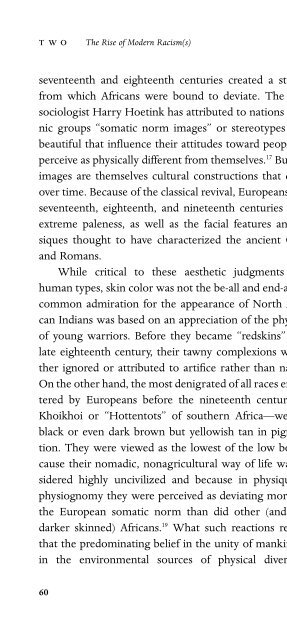Racism - A Short History - George M Fredrickson.pdf - WNLibrary
Racism - A Short History - George M Fredrickson.pdf - WNLibrary
Racism - A Short History - George M Fredrickson.pdf - WNLibrary
Create successful ePaper yourself
Turn your PDF publications into a flip-book with our unique Google optimized e-Paper software.
THREE Climax and Retreat<br />
tives for racial reform in the United States. Statesmen, policy<br />
makers, molders of public opinion, and even judges<br />
became increasingly sensitive during the postwar years to<br />
the international liability of America’s racial practices in the<br />
struggle with the Soviet Union for the “hearts and minds”<br />
of people in what came to be known as the Third World. 52<br />
The Communists had some natural advantages in this conflict.<br />
Marxist ideology was insistently “nonracialist”; the<br />
various non-European nationalities in the Soviet Union<br />
were, on paper at least, equal under the law; and blacks<br />
from the West who visited Russia could be entertained in<br />
a manner that seemed to demonstrate a total absence of<br />
color prejudice. During the early Cold War, the Soviets<br />
gained an enormous propaganda advantage in calling attention<br />
to America’s practice of segregation and to the incidents<br />
of racial violence and terrorism that continued to<br />
occur in the southern states. When several of Europe’s African<br />
colonies became independent in the late 1950s and<br />
early 1960s, discrimination against African diplomats in<br />
Washington, D.C., and the surrounding area became a<br />
major embarrassment for the State Department that<br />
helped to provoke some of the earliest federal efforts toward<br />
the desegregation of public facilities. 53<br />
The geopolitical costs of the persistence of legalized<br />
racism in the United States were high enough to raise the<br />
question of why it took two full decades from the end of<br />
World War II and the onset of the Cold War for Congress<br />
to pass the civil rights legislation that outlawed Jim Crow<br />
and gave protection to black voting rights. Indeed, it was<br />
not until 1967 that a Supreme Court decision nullified the<br />
last state laws enshrining the central symbol of a racist re-<br />
130
















